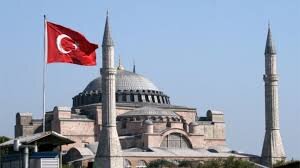Hawzah News Agency - (Istanbul - Turkey) - As Hagia Sophia assumes its true identity, the East and West, primarily the Islamic world, have turned their attention to Istanbul. The significance of prayers of gratitude being performed, particularly in countries like Afghanistan, where imperialist powers know no limits in the violation of rights and law, should not be overlooked. The reinstatement of Hagia Sophia Mosque’s true status was closely followed in the Balkans and the Caucasus as well. Our friends, who closely follow Africa, are also saying that Muslims in Somalia, Ethiopia, South Africa, Senegal, Togo, Guinea, Nigeria, Chad, Niger, and Mauritania are expressing their pleasure upon this occasion.
Statements reported from North African countries such as Libya, which we are more involved in today, have also welcomed the Hagia Sophia Mosque assuming its true identity. The Libyan muftiate reacting to statements from Arab official authorities is meaningful as well. The reaction of the Libyan muftiate is also a sign that the rift between Arabs and their official authorities is increasingly growing. Egypt’s putschist Sisi administration openly stated that it is against Hagia Sophia’s mosque conversion. Certain religious institutions have also endorsed the attitude displayed by the Cairo administration.
The reinstatement of Hagia Sophia Mosque, contrary to the Arab region, is causing more of an identity-based polarization in the Caucasus, Anatolia, and the Balkans. The fact that the change was prolonged even though Hagia Sophia was always on Turkey’s agenda, shows the difficulty of the matter. While the conservative opposition says, that as a reflection of its pro-West preferences, Hagia Sophia it is now opened up to political debate, it has done nothing but shoot itself in the foot with this argument. The conversion of Hagia Sophia into a mosque required a great will; public support was necessary and it was a real issue that needed to be addressed. The fact that it was a hot-button topic is obvious from the identity-based discussions. Hence, it is possible to comprehend the objection to Hagia Sophia assuming its true status with an emphasis on identity. However, those trying to adopt an angle with statements such as, “Hagia Sophia is now open to political discussion,” “The city has fallen,” and “Turkey’s oppression started in 1453,” cannot be taken seriously in any way. Thus, the identity-based discussions revolving around Hagia Sophia Mosque assuming its old identity are important.
It is not easy to foresee the effects of the identity-based discussions ongoing in the Balkans, Anatolia, and the Caucasus through Hagia Sophia Mosque starting from today. However, when we consider it alongside the July 15 coup attempt, it is clear that these discussions will have a transformative impact. Istanbul was a hub, and this city’s impact reached places from East Turkestan to the Java Islands. Similarly, Istanbul had an impact in the depths of Africa. The power of thought should be noted here. When Hagia Sophia assumed its true identity, the ideas that sprouted on July 15 started to be represented in Istanbul. We emphasize the significance of symbols enough, however, they need to be explained as well. The Turkish and Islamic world became a hub once again. It can be said that a century-long era is now in the past. This is not a caliphate debate. Istanbul becoming a hub once again is a real issue. In this sense, the identity-based discussions should be particularly emphasized. This era will reflect on our whole region, including Anatolia. New ideas will transform the region.
During the modernization period, Turkey experienced a unique process of socialization. A socialization period based on solidarity enabled politics to spread to the base of the community. Since the process of Islam’s politicization was generally discussed from an orientalist perception, the judgments that were prevalent were negative. However, the spread of politics through the base can be evaluated extraneous to the orientalist perception. As we are not a caste society, the high voting participation indicates a new situation. It can also be said that there is direct correlation between the higher participation rate and the spread of change through time. This makes change permanent. The politicization of Islam encouraged participation in the political process, leading to the formation of a wide-base foundation in terms of legitimacy. President Recep Tayyip Erdoğan’s national and local discourse thrives on this wide base.
If the pandemic was not ongoing, Hagia Sophia’s opening would have witnessed the participation of millions. This is clearly something else. Hagia Sophia Mosque is opening to the whole of our region.


Your Comment